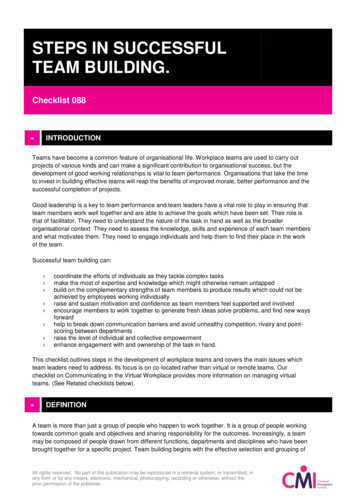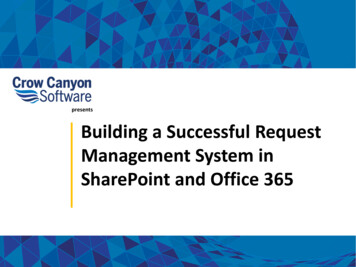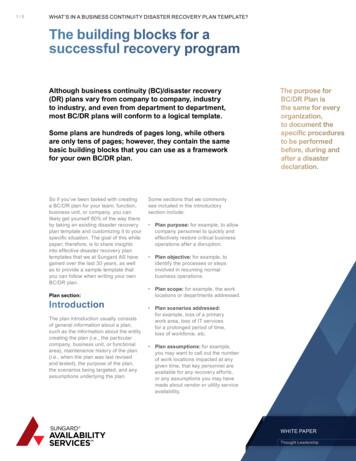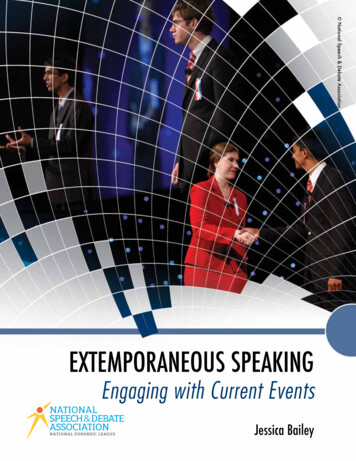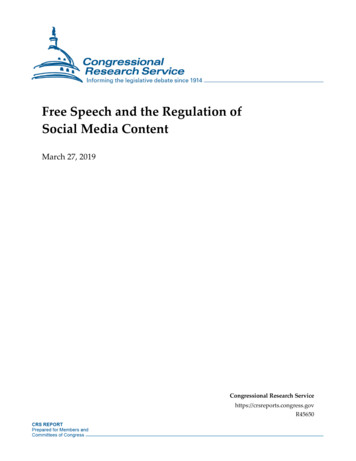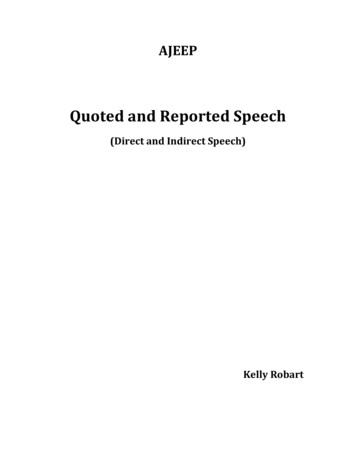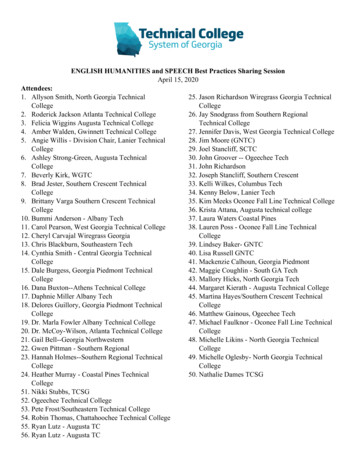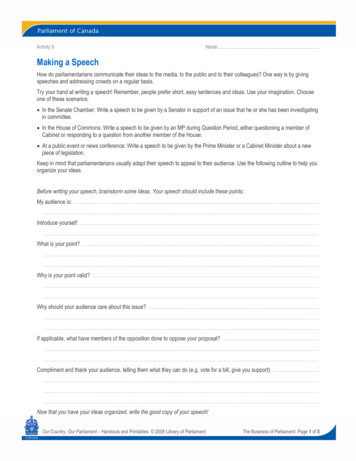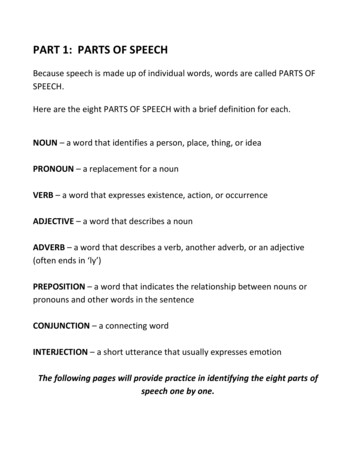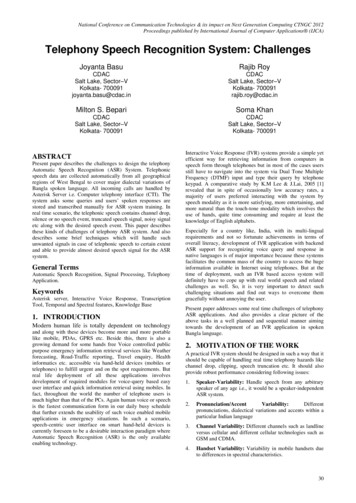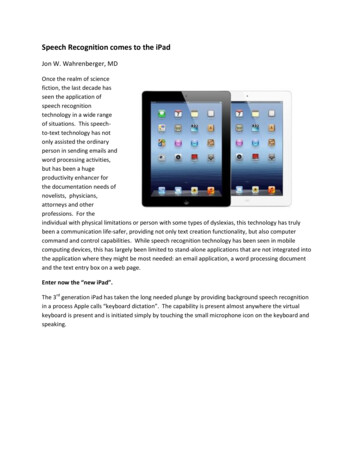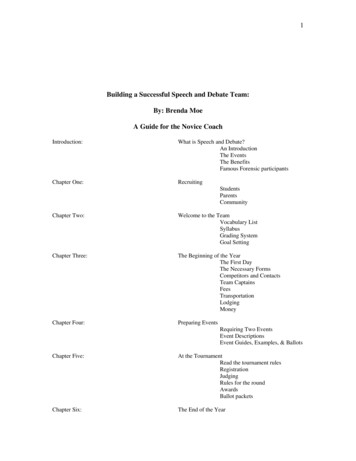
Transcription
1Building a Successful Speech and Debate Team:By: Brenda MoeA Guide for the Novice CoachIntroduction:What is Speech and Debate?An IntroductionThe EventsThe BenefitsFamous Forensic participantsChapter One:RecruitingStudentsParentsCommunityChapter Two:Welcome to the TeamVocabulary ListSyllabusGrading SystemGoal SettingChapter Three:The Beginning of the YearThe First DayThe Necessary FormsCompetitors and ContactsTeam CaptainsFeesTransportationLodgingMoneyChapter Four:Preparing EventsRequiring Two EventsEvent DescriptionsEvent Guides, Examples, & BallotsChapter Five:At the TournamentRead the tournament rulesRegistrationJudgingRules for the roundAwardsBallot packetsChapter Six:The End of the Year
2BanquetAwardsPreparation for next yearIntroductionWhat is Speech and Debate?Checklist:I know what speech and debate isI know the national events and the events for my stateI can tell students about the benefits of speech and debateI have a list of famous forensic participantsHigh school forensics, competitive speech and debate, is recognized in all 50states. Programs range from hundreds of students to just a couple students. Affluentareas and very rural areas sponsor these speech activities. Some programs are completelyfunded through their school district, while others have to earn every cent they will spend.Competition rules vary from state to state and really don’t follow any uniformity. Thereis a national fraternal organization, The National Forensic League (NFL), that many highschool programs participate in. A program is not required to join the NFL, but the NFLsponsors the national champion tournament at the end of every school year (June);publishes a monthly magazine (Rostrum) that schools receive free of charge once theyhave joined NFL; and, it awards student competitors for their successes in forensictournaments.
3Each state will have a state finals tournament. Students qualify for thistournament by participating and placing in their district tournament. State finals andnational finals are not related. A student can do one or the other or both. Taking firstplace at state in an event does not guarantee a student will qualify for nationals. Thisstudent must then qualify at their district national qualifier (nat. quals). NFL events andtheir rules are consistent in every state. State events differ, so if you travel to anotherstate to compete, be aware of their rules and events.A school may choose how many tournaments to attend a year. This may varybased on funds, the coach’s willingness to be away from home, the distance totournaments, transportation availability, and student conflicts (homecoming, track meet,basketball finals, etc.). Your state will publish a list of tournaments at the beginning ofevery year. This frequently changes, so always double check that the tournament is stillrunning on the projected date or if new tournaments have been added to the schedule.So, what does the word forensics mean? Much confusion arises from theuse of this word in the speech and debate world. William McCrady (2003) captured theconfusion in a few quotes from his article What’s in a Word?“I didn’t join til senior year because I thought it had to do with investigatingcrime scenes.”“Isn’t it like “Future Detectives of America?”“I thought it had to do with looking at dead bodies!”As a new coach, I had to research the meaning of the word. I am a big Law and Orderfan, so forensics had only a scientific, dead-body meaning for me. Let me provide youwith a definition borrowed from Directing Forensics: Contest and Debate Speaking
4(1976):Forensics:The term “forensic” is derived from the Greek Language and refersto courts of law. Aristotle, in dividing speech into three categories, contrastedforensic speaking (in a court of law) with deliberative speaking (in the legislativeassembly), and epideictic speaking (in a ceremony or other special occasion). Theterm is still used today in such a restricted sense. For example, a physician whospecializes in the study of medicine in relation to the determination of legal questionsis said to practice forensic medicine. (p. 35)In common usage today, the term has developed a broader meaning. A moderndictionary defines forensic as an adjective meaning “suitable for public speaking ordebate.” In many parts of the United States, the plural forensics is used to referto any extracurricular speech activity in both high school and college. (p. 36)What are the events?The national events sponsored by the NFL (detailed descriptions of events can be found in chapter five):1.Extemporaneous Speaking2.Original Oratory3.Interpretation (Dramatic, Humorous, and Duo)4.Cross-Examination Team Debate5.Lincoln/Douglas Debate6.Congressional Debate (Student Congress)
57.Public Forum Team DebateWhat are the benefits?Now that you have an idea of what speech and debate is, let’s look at the benefitsof participating in a forensics program. Share these with your students and while you arerecruiting. Students who participate in forensics will:1.learn to overcome and calm speaking anxieties2.receive valuable training for college and future careers3.increase their public communication skills4.develop improved study habits and research skills5.develop time allocation and organizational skills6.advance critical thinking and reasoning skills7.become familiar with current societal issues8.be open to both sides of an issue,9.learn to consider and adapt to different audiences10.be more prepared to speak on their feet11.be more aware of a wider range of people, personalities, and cultures12.learn how to lose gracefully13.learn how accept criticism and be judged on their performance14.learn how to work with others, as individuals and a team15.learn how to perform with virtually no sleep16.learn respect for dissenting opinions17.learn that appearance is very important - wear the right clothes, get ahaircut, tone down the makeup, etc.
618.improve their college and career resumesFamous Forensic ParticipantsDisplaying or sharing the names of famous past forensic participants and NFLmembers will impress some of your students. It is important to list an array of people soeveryone can find someone to relate to. Don’t just list presidents or news anchors - findcomedians and actresses too. Let the kids see that forensics isn’t just for geeks. Coolpeople belonged and so do they! Shawnalee Whitney, Co-Director of Forensics andAssociate Professor of Communication at the University of Alaska Anchorage, compileda list of famous Forensic participants. This list can be found htm. A couple Internet searches willprovide a lengthy list. Following are a few names I like to throw around. For somestudents, well-known names connected to Forensics serves as a motivator. As abeginning of the year exercise, you may have students compile their own list.
7Famous Forensic Participants:James DeanNancy Cartwright (voice of Bart Simpson)Kelsey Grammar (Cheers and Frasier)Jim and John BelushiAdam SandlerSteve Buscemi (Starred in Fargo and Reservoir Dogs)Nelson Mandela (South African President)Margaret Thatcher (Former British Prime Minister)Richard NixonMarcia Clark (prosecutor in OJ’s trial)Oprah WinfreyJane PauleyRoger EbertLee Iacocca (Chrysler Corporation)Malcolm X
8Chapter OneRecruitingChecklist:Students are ready to or already have joined the team.Parents are willing to volunteer.A newsletter has been createdCommunity volunteers are willing to help with the program.StudentsIn order to have a team, one must first have students who are willing to compete.If an elective class (and therefore credit) is available to the students, it will be mucheasier to recruit for the team. If you are trying to create a class and team, please seeappendix A, an essay titled “In Defense of Competitive Speech.” A video, distributed bythe National Forensic League, “Discovering the Power of Speech” is another helpful tool.The National Forensic League will send this video to you at no cost. Check the website:www.nflonline.org. This will help you build your argument for the administrators andschool board.The majority of my team members are students who have taken Speech I (whichmay be a prerequisite for Competitive Speech and Debate). I show the NFL video tothese classes and require that they choose a competitive event to perform. This is a great
9introduction to the program. Other team members are recruited by their friends orrecommended to the program by other teachers (student council, leadership, drama, socialstudies and English classes, etc.). It is important to sell the speech program in any waypossible. Having senior members or anyone who has had speech and debate experiencewill probably be very willing to speak at an assembly about the benefits a speech anddebate member will reap. Students also enjoy performing at assemblies and the feedbackfrom staff and students is always very positive.In order to have more definitive reasons for why students join the team, I createda short survey at the end of the school year. I asked students (new and previous members)why they had joined the team (figure 1), what they hoped to gain from the experience(figure 2), and what the benefits and disadvantages were in the eyes of returningmembers (figure 3). The results of the anonymous survey are shown in the following piegraphs. Forty students were interviewed and their answers were recorded in the graphsbelow. If a student gave more than one reason for joining, both answers were recorded.Speech and Debate SurveyI am writing my thesis for my Master’s Degree on creating a speech and debate team.Could you please take the time to answer the following questions? I will be using your answersas research. You do not need to sign your name.1.Why did you join the speech and debate team? Be as truthful as possible please.2.If you are a new member, what do you hope to gain from this experience?3.(If you are a returning member)Since joining the team, what have you found to be the biggest benefit? The mostnegative aspect? Please be truthful.
10Figure 1 - Why did you join the speech and debate team?14%15%Friends3%CollegeCIM/CAM15%20%Gain Speaking SkillsLike Coach1%32%OtherTo Have FunAs you can see, the majority of the students joined because they want to increasetheir speaking and communication skills. There really is no better reason. These studentstend to be more motivated than those who joined because their friends did or because itsounded like fun. In reality, most students are motivated once they have competed intheir first tournament.
11Figure 2 - What do you hope to gain from this experience?15%Develop Communication Skills4%34%Win ArgumentsCIM/CAMMake Friends17%FunTravelingOvercome Anxiety11%15%4%Although this is another form of question one, students still responded in the samemanner. They want to develop communication skills, and they will. Second placebelongs to the “I hope to have fun” crowd. Students hear speech and debate memberstalk about how fun traveling and tournaments are. Overcoming anxiety about publicspeaking ranked as the third goal for new students. After that first tournament, kids willhave a completely new view on the fear of public speaking. They almost all get over itautomatically. It may take some time dissuading the fears of a few, but other teammembers are usually very helpful with pep talks and advice. We were all beginners atone time.
12For returning members:Figure 3 – What were the biggest benefits of joining the team?11%18%Enhanced Speaking SkillsEducational Value14%6%Exposed to a variety of ring Professional Attire14%14%The benefits are almost equal. Educational value and independence weren’t bigon the students’ lists. But, Number one benefit was enhanced speaking skills. A veryclose second was being exposed to a variety of people. Traveling, awards, andcamaraderie were tied for third. And, ranking fourth is the opportunity to wearprofessional, business attire. One might make the mistake of assuming this answer camefrom the girls, but that isn’t true. The young men like very much to strut their stuff anddress like lawyers and professionals.
13For returning members:Figure 4 – What were the most negative aspects you experienced?8%15%8%Stress of CompetitionSleep Depravation15%15%Issues with Team MembersDon’t Agree w CoachHard WorkMust Attend Tournaments39%No surprise here. The most negative aspect of being part of the team is having toget along with everyone, even that guy that picks his nose. I am very aware of howstudents treat each other. I will not allow meanness or ostracization. I am sure thateveryone has someone to feel welcomed by. I will ask certain members to watch overthose who may have a more difficult time fitting in or making friends. This way, no oneis left alone at tournaments. Second place goes to sleep depravation (referring totournaments – all too true), the stress of competition, and not agreeing with the coach or
14the coaching style. Good reasons. So now you have an idea of why kids join the teamand what they’ll be complaining about, let’s move on to the parents.ParentsParents can be so valuable to a successful program. They can help with judgingresponsibilities, therefore saving money on judging fees; they can help organize fundraisers; they can offer their homes for speech get-togethers; etc. Many students, as theyare teenagers, will not be gung-ho about asking their parents to help out or be part of theforensic experience. Some will readily volunteer their parents. I would suggest mailingnewsletters home – to the parents. A beginning of the year newsletter can cover manypoints of information and help the parents feel involved. A newsletter may contain – butis not limited to – the following:1.An explanation of forensics and the speech and debate team2.An explanation of how the students will be graded and what theexpectations for team members are3.A list of benefits that speechies will enjoy4.Meet the coaches – include pictures and vitae5.A list of tournaments the team is planning on attending for the year6.A request for parental volunteers to help in any way imaginable7.Explain the costs for students and their families (and that if they can’tafford to buy supplies or pay for tournaments there are other options – seethe coach privately)8.Pictures and names of team members and events they will be competing in9.Contact information – offer yours and ask for theirs (although the students
15will be required to provide this)10.A list of resources for debaters or interp pieces11.A vocabulary list of common terms their students may be using12.Tournament results13.Speechie of the month14.Articles written by studentsCommunity VolunteersThere a great number of ex-debaters and ex-forensic students out in the world andprobably in your community. Many lawyers and business men and women have forensicexperience. A coach can’t have too many volunteers, whether they are helping judge attournaments, helping raise money, or coming to listen to students and give feedback.Your school probably has a protocol that visitors or volunteers must follow, so checkwith the appropriate secretary before allowing community members to come into yourclassroom. Students may find volunteers they would like the team to utilize. Irecommend interviewing anyone before turning your competitors loose with them.My first year as a coach, the team constructed a letter that we mailed outto every lawyer’s office in town. We suggested that it was very likely many members ofthe office had participated in speech and debate themselves. Some background was givenon our team and our budget restraints. The team politely requested financial help so theycould travel to more tournaments so they could utilize their skills more often in a
16competitive arena. We included a tax deduction form from the district (check with theschool’s head secretary). The postage cost the team about 80.00, but we did receivedonations that totaled approximately 800.00. This (begging for money) may seemtacky, and it is, but a coach and team do what they have to do to keep their program alive.No matter how you get the community and parents involved, thank you notes are a must.A team captain can be in charge of this and be sure to have all team members sign theirnames. To save on postage, volunteers can deliver the thank you notes directly to thesource.
17Chapter TwoWelcome to the TeamChecklist:A vocabulary list is provided for new competitorsA syllabus is prepared for the student competitorsStudents have a file folderA grading system is in placeStudent and team goals have been recordedSpeech and Debate JargonThe vocabulary that accompanies a Forensic program is extensive. Much like anyjob or specialized area of interest, there are technical terms, slang, and unfamiliar wordsthat will be very confusing to the outsider. And, this confusion can be a source ofembarrassment, especially to new competitors. A goal of forensics participation is toease anxiety. Providing your students with a list of common jargon will help to reducethe stress that a new competitor is going to feel. I use the following list as a handout thefirst week of class. It is important to recognize and explain to students that each eventwill have its own set of terms. The following list is in no way comprehensive, but it is asolid foundation from which students can build upon. With experience and help fromseasoned competitors, students new to the program will be experts in no time.
18Some Basic Terms and Definitions Every Speechie Should KnowGeneral Speech and Debate Terms:Ballot – The piece of paper on which judges write comments, rankings, and the decisionof the roundBlocking – any movements made during a performance(to) Break – to advance to the next round(to) Cut – to take only selected sections from a piece. To cut to make time limits or tocut inappropriate materialDouble Entered – entered in more than one event in a patternEthics – rules or standards that govern conductExtemporaneous – speaking without the benefit of a prepared or memorized manuscriptFinals – an elimination round involving the top two teams in debate or usually the top sixcompetitors in IE’sForensics – Refers to competitive speech and debate and public speaking (not deadbodies!) Also abbreviated as “4n6”.Introduction – The introduction to a piece, usually found in interp, extemp, etc. Introsare written by the competitors and are memorized or given extemporaneously.
19Junior – a competitor in their first or second year of competition (used at tournaments)Novice – a competitor in their first year of competition (used at tournaments) or adivision in a tournament involving only first year competitorsOpen – specifying that all levels of experience will be competing with each other in atournament, a divisionPattern – events are divided into “Patterns” and run at different times, usually there arethree patterns in a tournament Pattern A events, Pattern B events, and Debate.Piece – the literature selection (title and author) you are performing in interpretationevents: DI, HI,DUO, Prose, and PoetryRound(s) – a complete debate or round of individual eventsSenior – a seasoned and experienced competitor (used at tournaments)Speechie – any competitor involved in forensicsTime Signals – Hand signals showing how much time you have leftTourney – abbreviation for Tournament
20Terms Specific to NFL:National Forensic League (NFL) – non-partisan, not for profit educational honorsociety founded in 1925. Its purpose is to encourage and motivate high school students toparticipate in and become proficient in the forensic arts: debate, public speaking, andinterpretation. A 10.00 fee is required for lifetime membership. Each competitor isresponsible for that fee once they have earned 25 points. The online address iswww.nflonline.org. Your coach or
In order to have a team, one must first have students who are willing to compete. If an elective class (and therefore credit) is available to the students, it will be much easier to recruit for the team. If you are trying to create a cla
